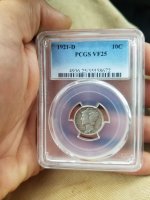historygrad09
Jr. Member
- Feb 17, 2015
- 20
- 11
- Detector(s) used
- White's XLT/White's MXT/Teknetics T2 SE/Garrett AT Gold
- Primary Interest:
- Relic Hunting
I have a quick question. As soon as you dig up an old coin, be it silver or copper, what is the first thing you should do to try and clean it. I am talking right out of the ground. In the past I would take a toothbrush with me hunting and clean it up a bit, or in lieu of a brush, I would use a small towel I had with me. Is it bad to do that to a coin right out of the ground or no? I have heard that some hunters will take a small vial of olive oil with them and immediately put the coin in that till they get home. Just looking for thoughts and suggestions. Thanks for any help you can give me.





